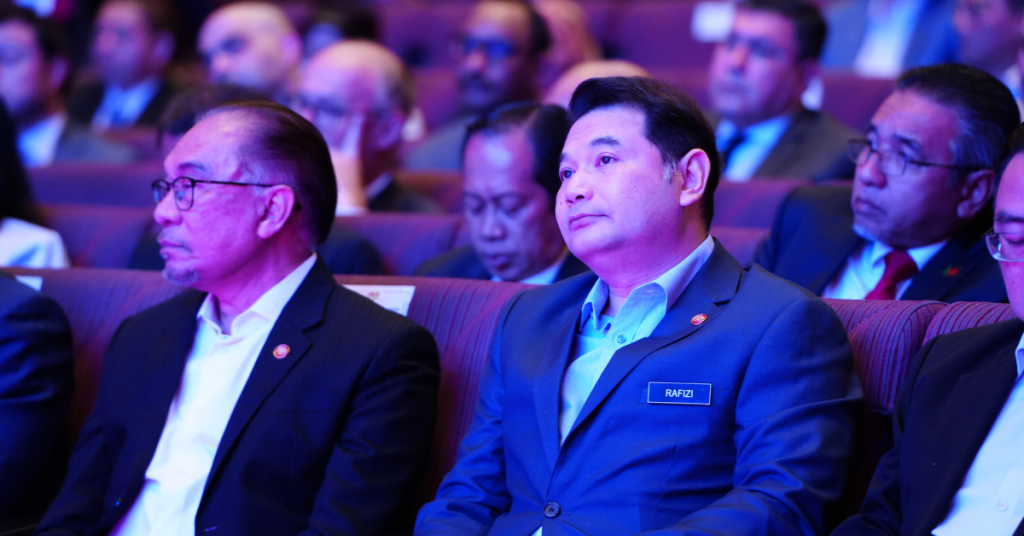In case you had been to ask high Malaysian college students what their profession objective is, what do you assume their reply could be?
Our Minister of Economic system, Rafizi Ramli, believes that many of those extremely educated Malaysians would desire a good, steady job at a giant company.
“And that presents an issue to the nation particularly as we’re pushing for increased worth kind of financial actions, particularly in startups and tech, the place this can be very, extraordinarily dangerous,” he identified.
He shared this on the primary day of the KL20 Summit 2024 throughout a panel titled “From Malaysia to the World: Open for Tech Enterprise”. He shared the stage with Dato Amirul Feisal (Managing Director of Khazanah), MX Kuok (Managing Accomplice of K3 Ventures), and Datuk Hajah Nik Amlizan Mohamed (CEO of KWAP).

After all, Rafizi himself understands that entrepreneurship is tough, which can be why it’s the trail much less taken.
“If I’ve the chance to relive the lifetime of a startup founder, having gone by way of it the primary time, I wouldn’t do it,” he admitted. “It’s really very tough.”
He identified that being a startup founder in Malaysia prior to now 10 to fifteen years was doubly tough in comparison with wherever else, partly as a result of the ecosystem of the yesteryears was geared in direction of greater firms with unicorn potential, reasonably than early-stage startups.
Nonetheless, the minister identified that it takes a strong ecosystem with a robust and extensive basis with the intention to sustainably produce unicorns.
And to get that to occur, Malaysians should change the way in which we view success and danger.
Rising a starvation for danger
Rafizi mentioned that the power of the federal government to vary our society’s success mannequin and danger aversion is one in all his greatest considerations.
“Malaysia as a rustic has constructed our economic system on giant scale sectors. Plantations, oil and gasoline, electronics, a lot in order that for the final 50 years, we take a look at employment in massive industries as an affirmation of success,” he defined.
The minister continued, “In case you had been to strike it by yourself right here, it’s very tough. It’s tough as a result of it’s dangerous, and it turns into a vicious cycle, exactly as a result of it’s dangerous, the capital wouldn’t are available in. The entire ecosystem doesn’t help it.”
And he believes that it’s our preoccupation with stability that’s the root of that problem. As such, it’s crucial to vary society’s urge for food for danger, success, and innovation.

Whereas rising this danger urge for food may come organically as extra founders are available in and discover success, the federal government is eager on catalysing the change in mindsets, in order that the nation can obtain the ambition of getting a high 20 startup hub by 2030.
“In the end, now we have to vary the fibre of society,” he mentioned. “And that goes into the training system, into the federal government’s focus. And that’s why we have to ship the sign to society that the federal government takes dangers critically.”
De-risking by way of continuity of capital
Persevering with that line of considering, Khazanah’s Dato Amirul Feisal shared, “One factor that may scale back the danger is the provision and the continuity of capital from early all the way in which into the late stage.”

And that’s the place establishments like Khazanah are available in. He believes that given their mandate and their attain, Khazanah is ready to take greater dangers, welcoming companions that take a look at the entire ecosystem, guaranteeing that capital continues from enterprise technology as much as Collection A and additional progress phases.
MX Kuok additionally chimed in on the dialog, believing that the continuity of capital can assist create a tradition of risk-taking in Malaysia.
“As a result of once they begin up an organization from zero to 1, they know there’s a path and line of sight to the milestones they should hit with the intention to graduate and proceed to increase abroad, for instance.”
And showcasing that path and its potential is what KL20 is about.
Extra failures, please
One thing else that MX thinks is necessary is to create a tradition that doesn’t punish failures.
He identified that the founders of giant firms like ByteDance and Meituan have all failed earlier than.
“If we impose on capital allocators to be not forgiving however goal in regards to the expertise and enterprise mannequin, then we may really be considerate in the way in which that the capital allocators rally behind people who find themselves proficient and keen to take dangers, however had been maybe on the flawed facet of the stick when it got here to the timing,” he defined.
Basically, failures must be one thing that’s celebrated and perhaps even wanted by capital suppliers. And with that change in perspective, extra individuals could change into inspired to enterprise into entrepreneurship, too.
Discover, not exploit
Sharing her wishlist for firms in Malaysia, Datuk Nik from KWAP said that she hopes to see extra explorative R&D being completed.

“I believe Malaysian corporates don’t spend sufficient on R&D,” she mentioned. “In the event that they do spend, it’s primarily on the exploitation of the present processes.”
That refers to analysis that’s centered on the development of what’s already being completed, reasonably than innovating one thing new solely.
For KWAP, they’re doing the latter internally by way of an innovation lab that’s set to hold out extra exploration.
However once more, specializing in explorative R&D reasonably than exploitative R&D could contain extra dangers, because it’s contingent on making an attempt new issues. However as Datuk Nik put it, that’s what it’ll take to degree up.
The imaginative and prescient of success
Earlier, Rafizi had talked about altering society’s success mannequin. So, what does success appear like sooner or later, as soon as we implement the above insights?
Apart from the standard metrics and numbers, the minister shared that he hopes to see extra early success tales.
“And after I say early success tales, it’s not essentially simply Malaysian-grown startups making it massive, both surpassing Collection C, going to greater than US$1 billion-US$2 billion valuations,” he elaborated. “However I need to see a confluence of tech abilities around the globe right here.”
The opposite bit is having extra firms able to go for itemizing domestically.

“If we examine our Bursa market with some others, our tech weightage could be very low,” he mentioned. “What a pity. As a result of it is a nation that’s recognised globally as one of the vital necessary semiconductor gamers on the earth.”
With extra IPO-ready firms in Malaysia, the federal government will be capable of focus extra on regulation and the ecosystem and fewer on funding and direct intervention. Principally, the ecosystem shall be extra self-sufficient.
To get to that future, we should start by realising that risk-taking is essential, and remove the concern that comes with failure. All that is simpler mentioned than completed, however with the federal government main the way in which by instance, hopefully extra Malaysians shall be keen and capable of make that leap of religion.
- Be taught extra about KL20 Summit right here.
- Learn different articles we’ve written about Malaysian startups right here.
Featured Picture Credit score: KL20 Summit

























